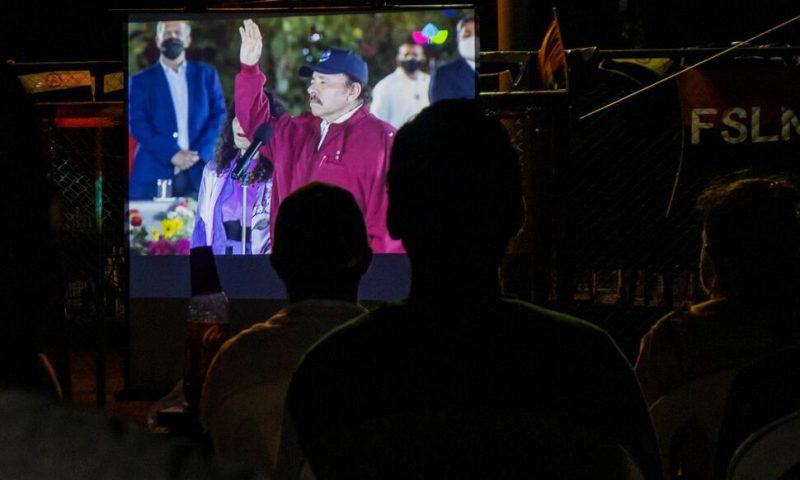The Biden administration is considering trying to expel Nicaragua from a lucrative regional free trade pact to retaliate against President Daniel Ortega’s crackdown on his opponents.
MIAMI — The Biden administration is considering trying to expel Nicaragua from a lucrative regional free trade pact — or allocate its valuable sugar quota to another country in Central America — to retaliate against President Daniel Ortega’s crackdown on his opponents, according to a U.S. official.
The economic impact of the action is still under analysis and no decision has been made, according to a U.S. official speaking on the condition of anonymity to discuss internal conversations.
But any action affecting billions in annual trade with the U.S. could inflict serious economic pain on the country’s business elite, who have mostly stood by silently as Ortega’s repressive tactics have grown, said the official.
“The Nicaraguan private sector has a choice to make,” said Eddy Acevedo, the son of Nicaraguan immigrants and chief of staff at the Woodrow Wilson Center in Washington. “They either continue aiding and abetting this tyrannical regime with blood on its hands or stand alongside the people of Nicaragua who yearn for freedom and democracy.”
Such economic patriotism may be hard to find with several business leaders already among those imprisoned.
Nicaragua has been holding what the U.S. considers daily show trials against antigovernment activists rounded up ahead of last fall’s elections. His likely opponents unable to compete, Ortega easily won a fourth consecutive term. Each defendant so far has been convicted and sentenced to prison.
The Biden administration’s response to Ortega’s authoritarian tilt has so far consisted of targeting individuals in the president’s inner circle and family members with sanctions cutting off their access to the U.S.
Expulsion from the Central America Free Trade Agreement, which was signed in 2004, would be a major blow, depriving Ortega’s government of important export earnings and foreign investment. Nicaragua is the only nation in CAFTA to run a trade surplus with the U.S., about $2.5 billion last year, or 20% of its gross domestic product. Hardest hit could be the textile sector, which produces goods for many U.S. retailers.
But booting Nicaragua from the trade pact is no easy feat.
CAFTA is an international treaty ratified by seven nations. It has no expulsion mechanism, so any attempt to corral Ortega would require Nicaragua’s neighbors plus the Dominican Republic, also a signatory, to withdraw from the agreement and negotiate a new deal in which other grievances — everything from U.S. agricultural subsidies to the impact on U.S. businesses — could be back on the table.
Additionally, U.S.-negotiated free trade deals don’t generally carry so-called democracy clauses like the one that was used in 2012 by Argentina and Brazil to suspend Paraguay from the Mercosur trade pact after the rushed impeachment of then-President Fernando Lugo.
“It would surely be messy,” said Eric Farnsworth, a former U.S. trade negotiator in the Clinton White House and now vice president of the Council of the Americas, which is funded by U.S. companies doing business in Latin America. “But it would send the right message to the private sector to stay away from Nicaragua.”
A less complicated alternative, says Farnsworth, would be for the U.S. to refuse to import certain products with the argument that Nicaragua is under U.S. sanctions. Such a move would effectively dare Ortega to sue under the treaty’s terms, kicking off a lengthy and costly process.
The other option under consideration, reassigning Nicaragua’s annual sugar quota to another country in Central America, would take away what is essentially a U.S. subsidy worth millions of dollars every year.
Farnsworth said hitting such a labor-intensive industry as sugar could stir resentment against Ortega in Nicaragua’s countryside, site of the bloody civil war in the 1980s fought between Ortega’s Sandinista army and U.S.-backed Contra rebels.
Choosing sugar could be a way to mobilize Carlos Pellas, Nicaragua’s wealthiest man and owner of the largest sugar producer. Pellas was a signatory to an open letter from business leaders after antigovernment protests in 2018, calling on Ortega to move up elections. He warned that the country’s economic model was bankrupt. But he’s remained on the sidelines, at least publicly, since Ortega really started cracking down.
His family, however, had major properties targeted for expropriation under Ortega in the 1980s and could be wary of suffering a repeat.
Ortega has already sent a clear message to economic elites who might oppose him. In June, police arrested two prominent business leaders, and in October the president and vice president of the country’s top business association, charging them with crimes including money laundering, acts that diminish the country’s independence and inciting foreign interference.
The charges were similar to those applied to his political opponents.
Just before the November election, the U.S. Congress passed the Renacer Act, giving more tools to pressure Ortega. Among the law’s provisions was a mandate requiring the White House review Nicaragua’s participation in CAFTA. It also called for a report on Russia’s security ties with Nicaragua, which is due later this month.
Manuel Orozco, a Nicaragua expert at the Inter-American Dialogue, said Ortega’s government is already in violation of several components of the trade agreement, especially labor provisions.
But he warned that disbanding CAFTA could backfire and even benefit Ortega, who could try to reimpose tariffs on imported U.S. goods and blame Biden for the added cost to consumers.
“It’s a double-edged sword,” Orozco said. “If you try to dismantle CAFTA it could mean more revenue for the Nicaraguan government.”

